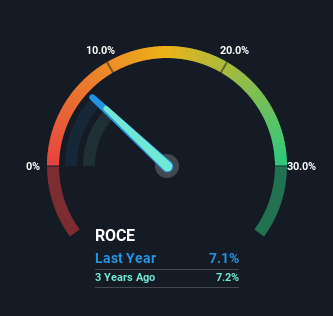- New Zealand
- /
- Renewable Energy
- /
- NZSE:MEL
There's Been No Shortage Of Growth Recently For Meridian Energy's (NZSE:MEL) Returns On Capital

What trends should we look for it we want to identify stocks that can multiply in value over the long term? Firstly, we'll want to see a proven return on capital employed (ROCE) that is increasing, and secondly, an expanding base of capital employed. Basically this means that a company has profitable initiatives that it can continue to reinvest in, which is a trait of a compounding machine. With that in mind, we've noticed some promising trends at Meridian Energy (NZSE:MEL) so let's look a bit deeper.
Return On Capital Employed (ROCE): What Is It?
For those that aren't sure what ROCE is, it measures the amount of pre-tax profits a company can generate from the capital employed in its business. Analysts use this formula to calculate it for Meridian Energy:
Return on Capital Employed = Earnings Before Interest and Tax (EBIT) ÷ (Total Assets - Current Liabilities)
0.071 = NZ$655m ÷ (NZ$9.8b - NZ$600m) (Based on the trailing twelve months to December 2022).
Therefore, Meridian Energy has an ROCE of 7.1%. On its own that's a low return, but compared to the average of 2.3% generated by the Renewable Energy industry, it's much better.
View our latest analysis for Meridian Energy

In the above chart we have measured Meridian Energy's prior ROCE against its prior performance, but the future is arguably more important. If you're interested, you can view the analysts predictions in our free report on analyst forecasts for the company.
SWOT Analysis for Meridian Energy
- Earnings growth over the past year exceeded the industry.
- Debt is not viewed as a risk.
- Dividend is low compared to the top 25% of dividend payers in the Renewable Energy market.
- Annual earnings are forecast to grow for the next 3 years.
- Good value based on P/E ratio compared to estimated Fair P/E ratio.
- Dividends are not covered by cash flow.
- Annual earnings are forecast to grow slower than the New Zealander market.
What Does the ROCE Trend For Meridian Energy Tell Us?
Meridian Energy's ROCE growth is quite impressive. Looking at the data, we can see that even though capital employed in the business has remained relatively flat, the ROCE generated has risen by 58% over the last five years. So it's likely that the business is now reaping the full benefits of its past investments, since the capital employed hasn't changed considerably. It's worth looking deeper into this though because while it's great that the business is more efficient, it might also mean that going forward the areas to invest internally for the organic growth are lacking.
The Bottom Line
In summary, we're delighted to see that Meridian Energy has been able to increase efficiencies and earn higher rates of return on the same amount of capital. Since the stock has returned a staggering 131% to shareholders over the last five years, it looks like investors are recognizing these changes. With that being said, we still think the promising fundamentals mean the company deserves some further due diligence.
If you want to continue researching Meridian Energy, you might be interested to know about the 2 warning signs that our analysis has discovered.
If you want to search for solid companies with great earnings, check out this free list of companies with good balance sheets and impressive returns on equity.
New: Manage All Your Stock Portfolios in One Place
We've created the ultimate portfolio companion for stock investors, and it's free.
• Connect an unlimited number of Portfolios and see your total in one currency
• Be alerted to new Warning Signs or Risks via email or mobile
• Track the Fair Value of your stocks
Have feedback on this article? Concerned about the content? Get in touch with us directly. Alternatively, email editorial-team (at) simplywallst.com.
This article by Simply Wall St is general in nature. We provide commentary based on historical data and analyst forecasts only using an unbiased methodology and our articles are not intended to be financial advice. It does not constitute a recommendation to buy or sell any stock, and does not take account of your objectives, or your financial situation. We aim to bring you long-term focused analysis driven by fundamental data. Note that our analysis may not factor in the latest price-sensitive company announcements or qualitative material. Simply Wall St has no position in any stocks mentioned.
About NZSE:MEL
Meridian Energy
Engages in the generation, trading, and retailing of electricity to residential, business, and industrial customers in New Zealand, Australia, and the United Kingdom.
Proven track record with adequate balance sheet.
Similar Companies
Market Insights
Community Narratives




